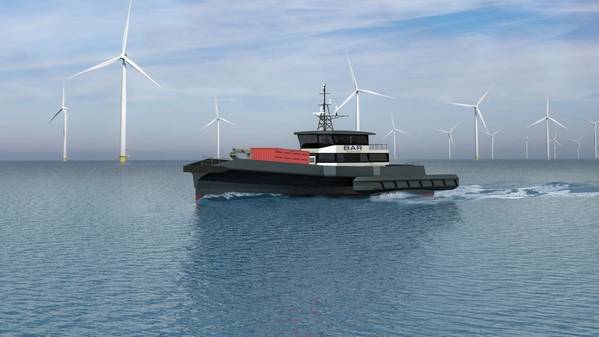
BAR Technologies and Chartwell Marine have received Approval in Principle (AiP) from the American Bureau of Shipping (ABS) for the design and construction of a BAR 30m crew transfer vessel (CTV) aimed for operations in the growing U.S. offshore wind sector.
In a joint statement on Tuesday, BAR and Chartwell said that securing AiP offered the highest level of assurance that these innovative vessel designs will be built in-line with specific US requirements.
"As part of the AiP process, the vessel designs have met stringent criteria from the ABS Rules for Building and Classing High Speed Craft 2020. This provides validation that they are well-placed to meet the demands and regulatory requirements of US operations," the companies said.
"This AiP is a further stepping-stone towards an advanced, class-certified, Jones Act compliant fleet of offshore wind support vessels for the US market. Following on from the AiP awarded to the Chartwell 24 vessel design earlier this year, it expands the range of complementary options available to the industry for highly efficient and capable vessel support," Chartwell said.
Vessels servicing the expanding East Coast offshore wind development areas will increasingly need to travel further for longer while navigating deeper waters and greater wave heights. This must be achieved without compromising on efficiency or environmental standards, in accordance with US coastguard guidelines surrounding emissions and Right Whale compliance, Chartwell and BAR said.
In response to this challenge, BAR, with the support of Chartwell, has developed a 30m CTV, making use of FOSS technology (foil optimised stability system) to enhance seakeeping and maneuverability, while reducing vertical acceleration by up to 70% in 2.5m wave heights. While offering greater levels of availability in rough seas, the BAR 30m CTV also demonstrates up to 50% fuel efficiency savings at 15 knots, keeping emissions at bay in line with stringent EPA Tier 4 guidelines.
"Securing AiP offers the highest level of assurance that these innovative vessel designs will be built in-line with specific US requirements. As part of the AiP process, the vessel designs have met stringent criteria from the ABS Rules for Building and Classing High Speed Craft 2020. This provides validation that they are well-placed to meet the demands and regulatory requirements of US operations," Chartwell said.
Andy Page, Naval Architect and Managing Director at Chartwell Marine, said: “This ‘rubber stamp’ from ABS paves the way for these next-generation vessels to fully integrate into East Coast operations. The design of these boats has capitalized on operational experience in the global market, refining the formula for offshore wind support through ongoing research and discussion with stakeholders.”
Andy continues: “With the first Chartwell 24 working in the UK and the first US Chartwell 24 in build, we are excited to work with BAR to bring a further, highly versatile option to the US market.”
John Cooper, CEO, BAR Technologies, said: “Approval in Principle for the BAR 30m CTV is an important development that broadens the opportunities for cross-market collaboration. As we work towards the decarbonization of the workboat sector, this latest innovation represents new gains in efficiency which have been achieved by placing the operational profile at the forefront of vessel design. In this way, we have been able to design a CTV that combines optimal performance in challenging conditions with a significantly reduced environmental impact.”